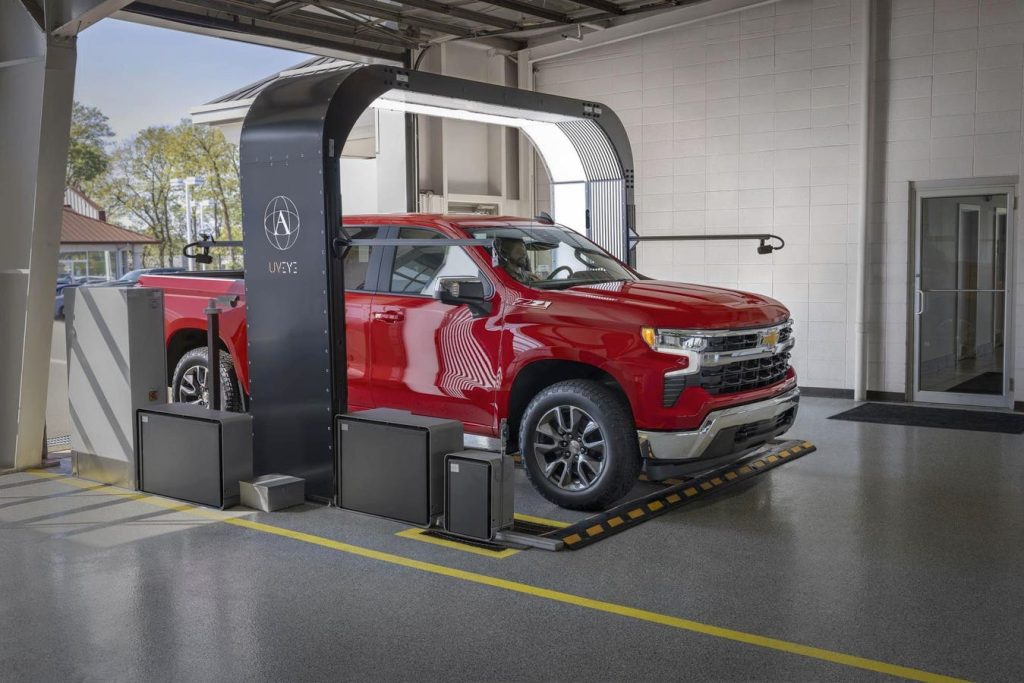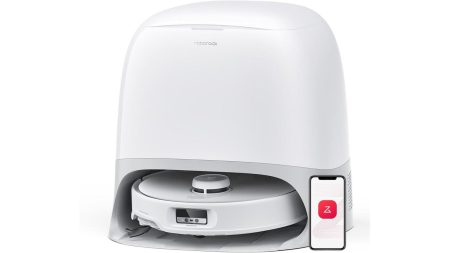It’s not uncommon for conflicts to arise between auto dealerships and customers on damage to loaner or rental vehicles. But a new partnership announced Wednesday between tech company UVeye, General Motors Co. and fleet management software company Connexion Mobility aims to avoid those conflicts.
UVeye produced AI-powered vehicle drive-through inspection stations are installed at many GM dealerships. The stations instantly detect physical defects and damage to a vehicle’s structure and tires.
Under this new partnership, GM dealerships can run their loaner and rental vehicles through the UVeye inspections and the results will be integrated into Connexion’s OnTRAC platform to document damage before and after use by a customer. The results are also sent to the customer by text message.
“You know exactly what was the condition of the vehicle, you see exactly how you returned it. No one thinks that you’ve done any damage,” said Amir Hever, UVeye co-founder and CEO in an interview.
For GM dealers who have already installed UVeye inspection systems screening their rental and loaner fleet is an additional return-on-investment consideration, pointed out UVeye chief marketing officer Yaron Saghiv.
“Over 4,000 dealers are going to be able to use this from day one, which is most of the GM network,” said Saghiv in an interview.
“This is a significant announcement for General Motors dealers,” said David Marsh, executive director, GM customer care and aftersales in a statement. “The integration of OnTRAC and UVeye will not only streamline the loaner fleet process but also enhance the overall customer experience.”
In 2022 UVeye and GM first announced a partnership to install the drive-through inspection systems at the automaker’s U.S. dealers, making GM the fourth automaker to invest in UVeye, joining Hyundai Motors, Volvo and Skoda.
UVeye was founded in Israel in 2016 by Hever and his brother Ohad. Their drive-through inspection technology was first used to detect contraband in vehicles at international border crossings.
European automaker Skoda was the first to use UVeye technology at its assembly plants to flag any defects during the manufacturing process starting in 2018.
Since then the company opened offices in Teaneck, N.J. and Norcross, Ga. as its business expanded.
“We’re continuing to support Amazon and their rollout to more distribution centers. We continue working and expanding with Carmax. We’re installing a lot more GM dealerships,” said Hever. “It’s over350,000 unique cars a month and we think that we’re going to at least triple it in 2024. We’re installing over 30 systems a month now.”
Its three inspection systems for use at new- and used-car dealerships, used-car auctions and major fleets are:
●Helios – An underbody scanner that detects a wide variety of problems including frame damage, missing parts and fluid leaks, as well as brake- and exhaust-system issues.
●Artemis – A system that checks tire quality. Within seconds it identifies tire brand, technical specifications, air pressure, tread depth, sidewall damage, whether or not a vehicle’s tires are mismatched and alignment issues.
● Atlas and Atlas Lite – A 360-degree vehicle-exterior detection system that checks sheet metal and other external body components such as bumpers, door locks, grilles and windows. Atlas Lite is specially designed for dealership use.
The Artemis inspection technology has taken on new significance, having discovered the weight of electric vehicle batteries is causing tires on EVs to wear out much sooner than on conventional internal combustion engine vehicles.
“We are starting to work with tire manufacturers to help them with the remodeling of the tires, especially for the EVs now that we’re seeing that there is a big change,” said Hever. “We’re working with the OEMs to share with them kind of the insights that we’re seeing from the market.”
UVeye plans to publish “soon” some of the results of its EV tire inspections to create greater awareness among manufacturers and consumers, according to Hever.
As for this new partnership with GM and Connexion to screen dealer rental and loaner fleets, it won’t directly generate revenue for UVeye, since it’s not charging dealerships for the service.
“We’re trying to create more value to our customers, not necessarily by selling them more services, but leveraging the existing services— how they can use it for other use cases,” said Hever.”
Read the full article here





